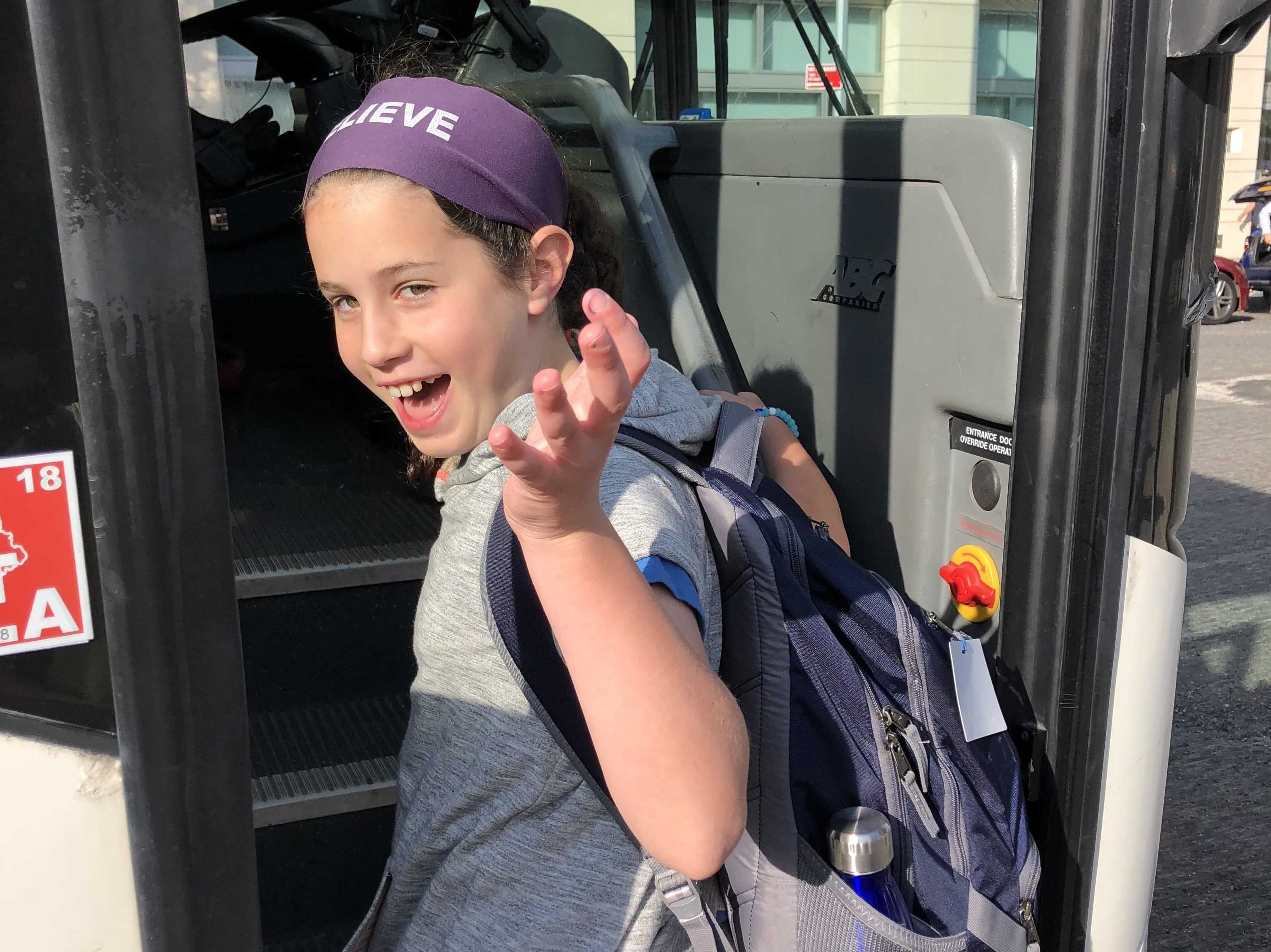If your house looks anything like mine right now, there are boxes in every corner filled with sunscreen, flip flops and flashlights. An extra large bottle of anti-lice shampoo holds pride of place on the cluttered dining room table alongside DD batteries, personal fans and monogrammed storage boxes. Summer camp season is upon us and most probably, the explosion of battery-operated gear and highly curated July 4th paraphernalia were the result of several in-depth conversations between you and your daughter. Crucial decisions like what color Tevas she should buy and what tapestry should decorate her bunk undoubtedly involved complex negotiations and multiple Amazon orders.
But what about the conversations that have to do with your daughter underneath all the stuff? And even more so, what does it mean to send your tween daughter off for the summer with the potential that she may experience big, important life changes while she is away? How does it feel that your daughter might get her period for the first time surrounded by friends and counselors but not by you? What are your emotions as you envision your baby girl shaving the downy hair from her legs using a pink, disposable Bic razor? We equip our girls with the gear to unpack once they arrive at camp. We also need to equip them for the larger experiences to come during the summer. Sometimes I think we and our children obsess over the minutiae of packing so that we don’t have to think about the larger existential issues underlying the departure for camp. While you continue to pack, for her sake and for yours, please consider having three conversations with your daughter before she boards the bus to camp.
Explore with her the reliability of information she gets from friends.
Camp is where our children are immersed in the greatest petri dish of social interaction and experimentation and where they spend a lot of time sharing information and trying new experiences, some good, some not so good. For a tween girl that novelty and experimentation centers around her and her friends’ changing bodies. Many interactions at this age create memories that last a lifetime (and I don’t only mean the toasting marshmallows around a campfire memories.)
Your daughter may hear all sorts of information at camp but friends, as well-intentioned as they are, are not the most reliable sources. Ideally you are the one giving your child the foundational information on major life changes. You don’t need to deride her friends but you can make your point about the reliability of their information by saying something like: “Kids at camp may have learned all different sorts of things during the school year, some of it accurate and some of it not. If you hear anything that makes you feel confused or concerned, who are the grown ups you can talk to clarify what you heard?” Help her make a list of trusted adults at camp, think of it as an advisory council, to whom she can go to ask questions. In the meantime, decide for yourself what are two things about which you most want her to have accurate information, like breast growth or body hair removal, and choose those topics to cover at home before she leaves. You can’t cover everything in the next three weeks but you can prioritize a few things and begin to talk about them with love and with intention.
Address the issue of different body sizes, shapes and stages of development.
At camp, our children live in such close quarters. They are constantly changing their clothes, putting on bathing suits and hopefully, showering which provides lots of opportunities for them to compare their bodies to other people’s bodies. (N.B. Tween and teen boys compare their bodies to their friends’ just as much as tween and teen girls do.) Without creating alarm or stigma, how do you address the issues that come up around growing bodies?
First, it is our job to listen to our children’s concerns and fears about where they are in their development and hear how that affects them. Do not dismiss your daughter’s worries with tempting variations on the themes of: “You’ll be just fine” or “You’re perfect to me and Daddy.” Those responses don’t assuage concerns like: What if I’m the only one wearing a bra at camp this summer? Or what if everyone else in my bunk already has their period and I don’t? Help her give voice to what is keeping her up at night, not by jumping in to solve it immediately or explaining it away, but by sitting quietly while she gets it all out. Once your daughter has given voice to her worries, elicit from her some ideas for ways she can address those concerns. Once she’s run out of ideas, then you can add your own suggestions.
With respect to puberty and bodies in general, different is normal and we need to reinforce that concept with our kids. Research shows that girls’ self-esteem plummets by 25% between the ages of 9 and 14, over almost exactly the same time frame in which girls can enter puberty. Coincidence? I think not. Maybe your daughter got her period before everyone else or maybe she’s been waiting years to grow breasts while everyone is well on their way. Even though there is truly no “normal,” girls often feel that they are the outliers, the only one who is different. It is our job as parents to reinforce the fact that everyone’s development happens at different stages. It is normal for some girls to gain a lot of weight during puberty before they have a growth spurt or for some girls to have a major growth spurt without gaining much weight at all. Remind your daughter that as reassuring as it would be, there is no moment to moment schedule for how or when we move along the progression of physical development. There simply cannot possibly be a “normal” when you can begin a several year process any time over the range of six years.
Raise the question of what your daughter can do if she gets her period at camp.
Tween girls worry most about logistics, logistics, logistics. The “what if’s” of life: What If I get my period at camp? What if I don’t have a pad or tampon in my bag? The way to help girls move past the “what if’s” is to help them feel prepared and knowledgeable. First, ask her your daughter in a straightforward way: “Do you know what you would do if you got your period at camp this summer? Can we sit down together and talk through the options?” Don’t start by imagining what your daughter’s biggest concerns might be. Start by asking her, the same way you ask her what color bandanas she wants to pack or how many bathing suits she needs for camp. Her answers may surprise you or may seem trivial, but I can guarantee, they do NOT seem trivial to her. Once you have a sense what she’s most worried about, walk through each issue together and come up with a plan to feel prepared.
For instance, if her concern is: What if I don’t have the right stuff when I get my period? Tell her that together you’re going to create a “period pack” which will have pads, tampons and maybe some Thinx Tween underwear. The two of you can choose a fun pouch together that will fit in a backpack or an overnight bag and while you put the items into the pack, you will show her how each one works. If her concern is: What if I want to try using a tampon and you’re not there to teach me? Then before she leaves show her how a tampon works, describe how to use it and then come up with a list of people at camp, friends, counselors, staff, who your daughter would trust to help her. We can’t tell our daughters exactly when they will get their periods, but you will be amazed at how relieved your daughter will be when she feels more prepared for the unknown.
Over the course of the next few weeks, begin to test out some of these conversations. Even if it feels hard or uncomfortable to have complex conversations about your daughter’s changing body, you will get better at these conversations with practice, just as you’ve become a pro at packing her camp duffels. Calmly talking through things that feel overwhelming to your daughter signals to her that she can handle what is coming her way. Developing the habit of forming an advisory council of trusted adults to whom your daughter can turn is a lifelong skill that she will use in school, the workplace and beyond. And finally, cut yourself some slack. You will flub some answers, you will need a do-over, you will forget to pack her a critical item. Ultimately, that is the best possible modeling you can offer your daughter: that we are all works in progress.







